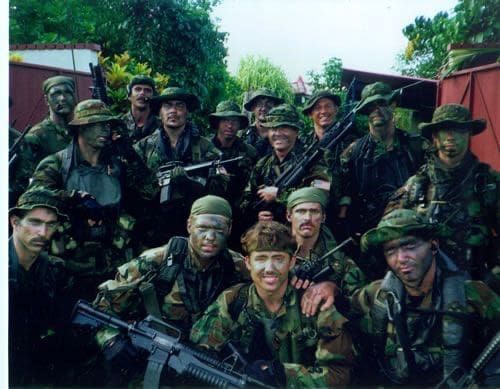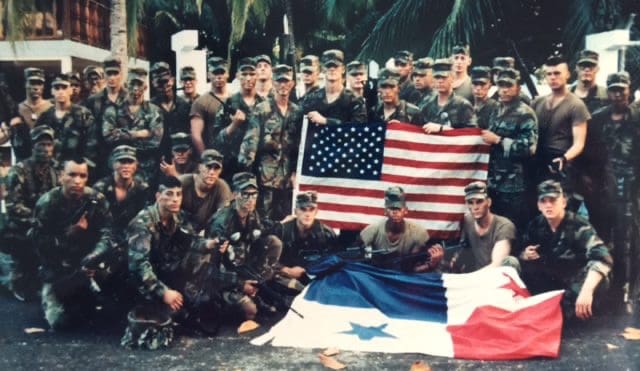President George H. W. Bush ordered the invasion of Panama on December 16, 1989. Its primary aim was to depose and capture Manuel Noriega, the country’s military dictator, charged in the United States on drug trafficking charges, dubbed “Operation Just Cause.”
Bush cited four reasons for the invasion: safeguarding the lives of Panama’s approximately 35,000 U.S. citizens; defending democracy and human rights; fighting drug trafficking in a country that had become a base for drug money laundering and a point of transit to the U.S. and Europe for drug trafficking and maintaining the dignity of the treaties signed by President Jimmy Carter.

27,684 U.S. troops and over 300 aircraft were involved in the campaign. It started with an attack on strategic assets, including the Panama City commercial airport and a garrison and airfield of the Panamanian Defense Force at Rio Hato, where Noriega maintained a home.
SEAL Team Four and Two sank Noriega’s private boat and destroyed his Panamanian gunboat.
Punta Paitilla Airfield was one of the worst days in SEAL team history. Team Four were tasked with destroying Noriega’s aircraft at the airfield. When first assigned, the SEALs to stand off and just shot up the plane so it couldn’t be used; as the day of planning went on, it got more and more complicated; it started with destroying the aircraft, to just shot out the engine, to shoot the tires to cut the tires. With three platoons of 48 operators total, this was more of a job for the Rangers; at 0030 hours on the 20th, the SEALs under the command of LtCdr Patrick Toohey inserted just south of the airfield from Zodiacs CRRC.
They were in place by 0105 hours, but safety elements announced that the Panamanian V300 Cadillac Gage armored cars were approaching the airfield quickly. Toohey sent a squad to set up a blocking position, but the Panamanians opened fire on the airfield as soon as they started to move, killing one SEAL and injuring five others. The other SEALs reinforced the troops under fire and suffered two more casualties and four more injuries in the ensuing firefight. They damaged Noriega’s aircraft with an AT-4 missile.

They rolled an aircraft into the middle of the runway during the night to prevent the airfield from being used. The injured were taken to Howard Air Force Base by MEDEVAC. The SEALs guarded the airfield until mid-morning when a company from the 75th Ranger Regiment relieved them. Team Four was also tasked with sending a recon team to watch one of the central prisons, as it was believed that when the invasion took place, Noriega would order all the prisoners to be released to help fight the Americans and add to the chaos. The Four Team guys that died were. LT John Connors, ENC Don McFaul, Torpedoman’s Mate 2nd Class Issac Rodriguez and Boatswain’s Mate 1st Class Chris Tilghman.
Don McFaul purposely laid himself across a brother during the gunfight to shield him and was honored by the posthumous award of the Navy Cross and the Purple Heart. The USS McFaul (DDG-74) was named in honor of CPO Don McFaul.

SEAL Team TWO was tasked with sinking Noriega’s boat. Four SEALs were inserted from Zodiac that had departed from NSW Unit 8. The swim pairs planted explosives on Presidente Porras’s pier. They then swam and plated explosives on Noriega’s boat and were then fired at by Panamanian guards who threw grenades into the sea. The SEALs swam to the pier and could see the gunboat destroyed by the explosions, hiding beneath it. They later swam back out into the canal, where the CRRCs picked them up.

Operation Acid Gambit. The rescue of Kurt Muse’s. Muse was an American who grew up in Panama, got married, and moved back after his military service had ended. His wife was a schoolteacher from the DOD. In May 1989, he was arrested and placed in Modelo Prison for operating a clandestine anti-Noriega radio station. Muse was an (a ledged) CIA operative, one Panamanian newspaper reported.
President Bush determined that after getting a letter smuggled out of jail, but a U.S. military doctor allowed to treat him, Muse’s rescue was the course of action. 1st Special Force Delta (CAG) was tasked with his rescue
Delta began rehearsing the prison raid in a mockup they designed at Eglin AFB, Florida. They had used notes supplied by the doctor. Undetected, they fled to Panama and began tentative preparations to raid the jail. 23 Delta operators boarded four MH-6 “Little Bird” helicopters shortly after midnight on the 20th and landed on the prison roof.
The operators got to the most defensible position and prepared for Muse’s defense. Around 15 minutes later, an IR-strobe light signaled a passing chopper. They relayed their location by radio, and a 5th Infantry Division armored vehicle arrived shortly afterward, picked up everyone, and took them to safety. In the field and the Comandancia (Noriega’s Headquarters) across the street, Delta Snipers quickly removed sentries. To get attention away from Modelo Prison, two Air Force C-130 Spectre Gunships started shelling the Comandancia at that moment.
As soon as a rescue attempt began, one operator climbed down the building’s side to a window outside Muse’s cell to remove the guard tasked with killing him is a rescue was attempted.
The breaching team blew the door to the roof, and the extraction teams began two floors down the stairs to Muse’s cell. The Delta operators eliminated two guards, and another who was not armed and did not fight was bound. Muse saw their flashlight beams and saw their smoke. It was only then that he heard an American voice asking him to cover up. Delta operator Pat Savidge attempted to shoot the lock off, but with bolt cutters supplied by Delta’s Kelly Venden, it stood up and had to be cut off. Savidge said “Merry Christmas” to Muse, giving him body armor, goggles, and a Kevlar helmet. They climbed up to the roof again.
The now overloaded Little Bird started nose-diving for the street, 60 feet below, once onboard the MH-6 that was called back for extraction. Just a few feet from the road, the pilot regained control, and they flew down the highway, placing the gap between themselves and the prison just a few feet from the ground. The pilot was going to try to take off again after putting himself down in a courtyard. During the chaos, Savidge and Venden refused to cave in.
The severe ground fire took place as the chopper lifted off. Venden was struck in the chest and dropped 20-30 feet from the helicopter to the ground. To save his mate, Savidge grabbed his gear to hold onto him and was also pulled out. The Little Bird was peppered with fire on the right side of it and crashed. The skid pinched the ankle of Delta operator James Sudderth. The four operators were all injured, but Muse and the pilots were all right.
Now on the ground, the guys found the most defensible position and prepared for a counterattack. About 15 minutes later, an IR-strobe light signaled a passing chopper. They relayed their location by radio, and a 5th Infantry Division armored vehicle arrived shortly afterward, picked up everyone, and took them to safety.

Seize Rio Hato Rangers, Tocumen Airports: The 2nd and 3rd Ranger Battalions were charged with seizing the Rio Hato airfield, destroying the base’s PDF garrison [the largest in the military], and seizing the plush beach house of Noriega.
Two F-117A stealth fighter-bombers delivered two 2,000-lb at H-hour. This was done to shock and confuse the PDF garrison of the two of the most heavily armed infantry companies defending the airfield, and precision bombs were missing. The precision munitions only managed to wake the defenders.
The Rangers lowered thirteen C-130s flying from the U.S. into a vortex of fire from just 500 feet. Despite the incoming fire, two Rangers’ companies rushed and assembled to take the airfield, cut the Pan-American Highway running through it and capture a nearby ammunition dump.
Another company targeted a nearby NCO academy complex, and another hit the two PDF companies deployed to protect the airfield. The PDF defending the airfield was said to be Noriega’s best, and the firefight was furious. Two Rangers were killed and four injured when targeted in a friendly fire incident by a helicopter gunship. But within five hours, it was safe for the entire complex to include Noriega’s beach house.
The 1st Ranger Battalion jumped in to capture it and protect it for follow-up forces outside of Panama City, Torrijos [Tocumen] Airport, the national commercial airport location. The Rangers suffered just two deaths, with only five killed and 21 captured, while Panama’s losses were minor. Around an hour after the Rangers had secured the airfield, the 82nd Airborne Division arrived and started to jump in.
Special Forces Capture Pacora River Bridge Stop Bn 2000: A Co. 3rd Bn 7th Special Forces Group men stationed in Panama were assigned to oversee Fort Cimarron, home of Bn 2000, Noriega’s only armored unit. Under Major Kevin Higgins’ order, A-3-7 was informed that ten vehicles were leaving Cimarron. He and 24 Green Berets were heading to the Pacora River Bridge to stop the convoy from reaching Panama.

River Pacora Bridge
On the way, the Blackhawk helicopters flying to the bridge got lost, but they soared quickly, reaching the bridge over the armored column. Just as the Panamanians came to the eastern side, the S.F. troops got to the bridge’s western side. The slope to get up to the bridge was steep, and when the headlights of the Panamanian vehicles were illuminated, the heavily laden S.F. troops were getting to the bridge. Among the first men on the bridge were SFC ‘Tico’ Roman and SFC Dana Bowman, and they blasted the lead vehicle with AT-4s. That made the convoy stop in its tracks. But the Green Berets were mainly armed with M-16s, M-249s, and M-203s. Higgins had no hesitation. He called in close in air support from an AC-130 Spectre gunship, dangerously close to his men, and gunships decimated the column. By crawling under the bridge, the Panamanians attempted to get away from Spectre. But with machine-gun fire and buckshot rounds with M-203s, the S.F. forces raked the girders. Much of the night, the running firefight lasted with the Panamanians attempting to flank the S.F. forces, who were reinforced by A Co. 1st Bn, 7th SFG elements from Ft. During the night, Bragg. After their Sheridan armored reconnaissance vehicles moved from the airport, they eventually joined up with representatives of the 82nd Airborne later the next day.

Noriega remained at large for several days. Realizing he had few options in the face of a massive fugitive hunt and a $1 million reward for his capture, he sought refuge in the Vatican diplomatic mission in Panama City. However, the U.S. military’s psychological pressure on him and diplomatic pressure on the Vatican mission proved relentless — as was the nonstop playing of loud rock and roll music in the densely populated area.
Noriega surrendered on January 3, 1990. He was immediately put on an MC-130E Combat Talon I aircraft and flown to the United States. He was tried, sentenced, and sent to federal prison for 17 years.
Twenty-three U.S. soldiers were killed, and 325 were wounded during the conflict.
Operation Just Cause was not like the operation conducted today, and they’re still were some of the same problems that the U.S. had during the invasion of Grenada. The communications were still failing, and several units were unable to communicate with each other. At times, communication between Special Operations and conventional units was shaky and at others non-existent. Despite this in later conflicts, various elements of our Special Operations Forces laid the groundwork for engaging with each other. I did not talk about all of the missions that conducted by US Special Operation Forces; Development Group was also involved as well as other Special Mission units. I just tried to get a good portion of the story out there and show the different operations conducted during the invasion.
I checked into SEAL Team Four a couple of years after Panama; my first Leading Petty Officer was one of the people wounded on the airfield. I would never take anything away from the guys that were on the ground. There were many lessons learned, not just by Team Four, but by everyone on the ground. Not one unit didn’t have some problems. I will always call Team Four my home, and I am very proud of gowning as a SEAL and working in the “J” (that’s the jungle for you, none Team Cuatro folks). Lastly, please take a moment to remember all who have gone before us and their families celebrating another holiday without one of their loved ones.
























































































































